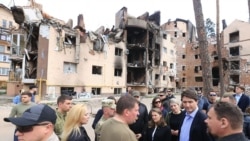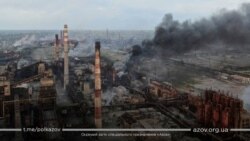On May 8, the Chinese Communist Party (CCP) mouthpiece, Global Times parroted a report by RT, the Russian state-owned media outlet, about a Canadian sniper who volunteered to fight in defense of Ukraine in the war.
In the accounts, the sniper quit and purportedly returned to Montreal with some harsh words about Ukraine’s military.
“The [RT] report said that, after returning home, he told local media that he had experienced ‘extreme disappointment’ in Ukraine. He also publicly accused the Ukrainian military of chaos, looting and incompetence,” the Global Times wrote. “He accused the Ukrainian army of inadequate weaponry, poor training, heavy losses, profiteering and desertion.”
While the story grabbed attention in China, it distorts an account published in La Presse, a French-language newspaper in Montreal, in which the sniper, who goes by the nom-de-guerre “Wali,” was quoted about his experience.
La Presse reported on Wali’s two months with other volunteers in Ukraine, including an initial stint with the “Norman Brigade,” a private volunteer unit founded by a Canadian army veteran.
In the La Presse account, titled “War is a terrible disappointment,” Wali described the horrors and frustrations of war, including having to scrounge for food, weapons and ammunition, and an incident in which two inexperienced Ukrainian conscripts were blown up by a Russian tank.
The newspaper said Norman Brigade members complained about shortages of weaponry and other matters, resulting in some members, Wali included, parting ways with the unit.
But RT and the Global Times cherry-picked the La Presse account, saying it described “looting, profiteering and desertion.” The characterizations take Wali’s more nuanced remarks and exaggerate them into an attack on the professionalism of the Ukrainian military.
That leaves a misleading impression, as the consensus about the war’s progress is that Ukraine has stalled Russian forces and inflicted heavy damage on them, despite being outgunned.
This was not the first distortion about Wali. In March, social media posts calling Wali “the best sniper in the world” falsely claimed he had been killed by Russian special forces.
“I was the last person to learn the news that I was dead,” Wali later said from Kyiv, according to a fact check by USA Today.
Volunteer sniper
Wali said he had served in Afghanistan with the Royal Canadian Infantry’s prestigious 22nd Regiment, known for elite snipers, and volunteered to fight Islamic State in Iraq in 2015.
Ukrainian President Volodymyr Zelenskyy called on international volunteers to help in his country’s defense after Russian President Vladimir Putin invaded on February 24.
Wali answered the call and said he arrived in Ukraine in early March, eager to make a difference.
“This defense was only possible thanks to the courage of Ukrainian fighters,” Wali wrote on his Facebook page. “I intend to contribute, at least a tiny bit, to the victory of this people who want to be free so much.”
Wali did not initially join the International Legion for the Territorial Defense of Ukraine, the unit Zelenskyy established for foreigners. Instead, he wanted to “get as fast as possible to the front” and avoid the long application process, Canadian broadcaster CBC reported.
So Wali linked up with the Norman Brigade, which was founded and commanded by a Canadian armed forces veteran with the nom-de-guerre “Hrulf.”
An account published in May by Canada’s National Post describes dissent within the brigade and complaints that it was under-equipped and unnecessarily risky for the Canadians in its ranks. But it also quoted Wali defending Hrulf as a “good fighter and warrior.”
“We are all on the same side against Russians, and that’s what matters the most,” Wali said.
The La Presse account also said all was not well among the Norman Brigade volunteers. “Dissension quickly set in among the troops and a large number of fighters deserted the Norman Brigade,” the paper’s account states.
La Presse cited three anonymous Norman Brigade members who said Hrulf promised weaponry and protective gear that never materialized. Hrulf confirmed to La Presse that 60 volunteers had left, and that others tried to form their own unit with $500,000 worth of U.S. weaponry.
While these accounts suggest disarray and rivalries, they do not report that Wali criticized the Ukrainian military for “looting,” “profiteering” or “desertion,” as RT and Global Times reported.
‘I made a mistake’
The La Presse story opens with Wali’s account of a tank shell blowing up two fellow soldiers who had ignored his warnings not to step away for a cigarette.
“I'm lucky to still be alive, it got really close,” Wali told the paper, adding that he had nearly been killed “several times” while in Ukraine. That, he said, was his last mission. He had missed his son’s first birthday while overseas.
In the account, Wali said he saw Ukrainian conscripts who had no combat experience and witnessed mounting casualties. He said he wished those “extremely brave” Ukrainian soldiers had received more tactical training.
Quoting Wali, La Presse wrote:
"It's a war of machines", where the "extremely brave" Ukrainian soldiers suffer very heavy losses from shelling, but "miss many opportunities" to weaken the enemy because they lack technical military knowledge, he summarizes.
“If the Ukrainians had the procedures we had in Afghanistan to communicate with the artillery, we could have caused carnage,” he believes.
After the La Presse article was published, however, Wali said on his personal website that he was overly focused on the losses he witnessed:
“I made a mistake … In interviews with reporters, I tend to talk too much about the terrible times when we suffered losses to the enemy. I don't talk enough about the fact that we are inflicting casualties on the enemy,” he wrote. “As a result, some articles give off a bitter impression of near defeat.”
“I do not speak enough of the fact that the enemy has been defeated several times. First in Kyiv: the enemy was not only stopped, but repelled. This same enemy finally decided to retreat after suffering heavy casualties. Next, in Donbass, eastern Ukraine: again the enemy was contained and suffered casualties. In several places, the Ukrainian forces are even regaining ground, a lot of ground."
Polygraph.info reached out to Wali for comment but did not hear back prior to publication. However, his views about the gains being made by Ukraine’s military are shared by many others.
One is Phillips Payson O’Brien, a professor of strategic studies at the University of St. Andrews in Scotland, who wrote in The Atlantic magazine that Ukraine’s military has pursued a strategy that “allowed a smaller state to – so far – outlast a larger and much more powerful one.”
“The Ukrainian way of war is a coherent, intelligent, and well-conceived strategy to fight the Russians,” O’Brien wrote.
“It has allowed the Ukrainians to maintain mobility, helped force the Russians into static positions for long periods by fouling up their logistics, opened up the Russians to high losses from attrition, and, in the Battle of Kyiv, led to a victory that has completely recast the political endgame of the Russian invasion.”
On his website May 12, Wali wrote:
"I often call the war a 'terrible disappointment.' Not that I myself am 'disappointed' with the war or my recent experience in Ukraine."
Update: After publication, Wali contacted Polygraph.info with a statement that included the following:
"The Ukrainian armed forces are not perfect. But they are an amazing force. ... A lot of the Ukrainian soldiers are not experienced. I am not frustrated by that. That's totally normal in any war, especially at the beginning. In fact, that's a good thing that we (the Ukrainian forces) have so many new soldiers on the front, as we are now outnumbering the enemy. These inexperienced soldiers will only get better and better. They already are."







